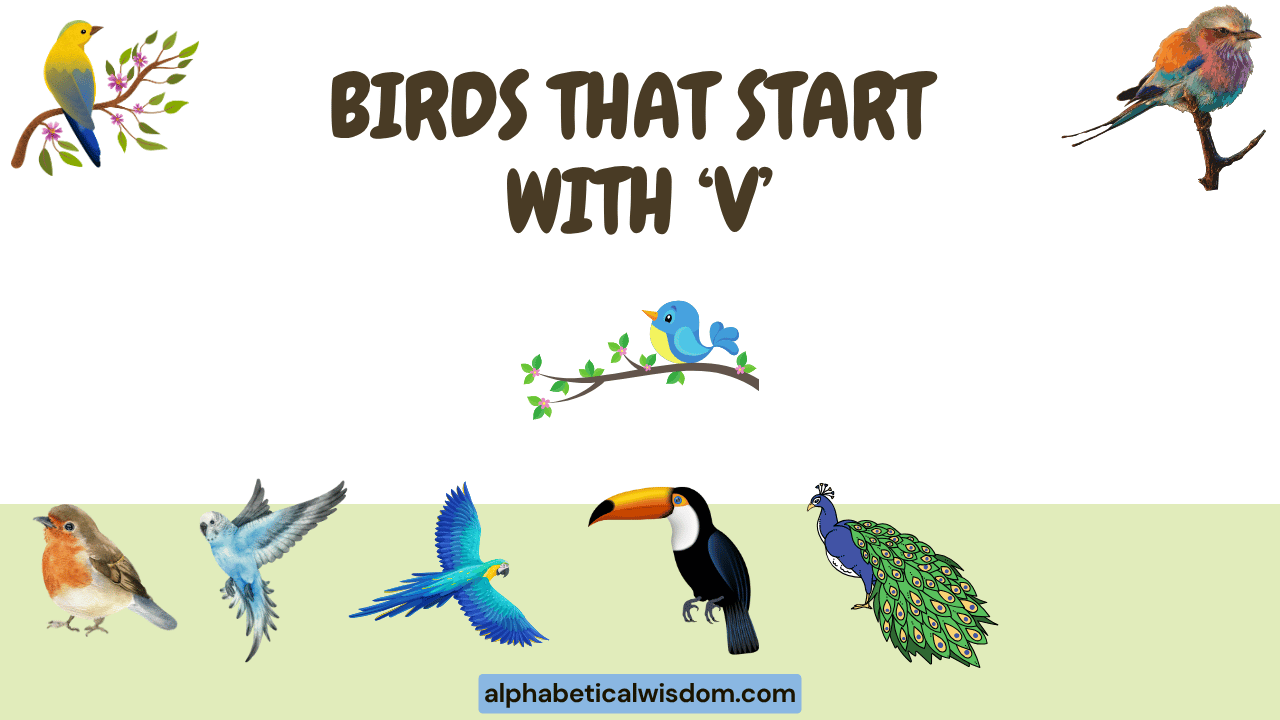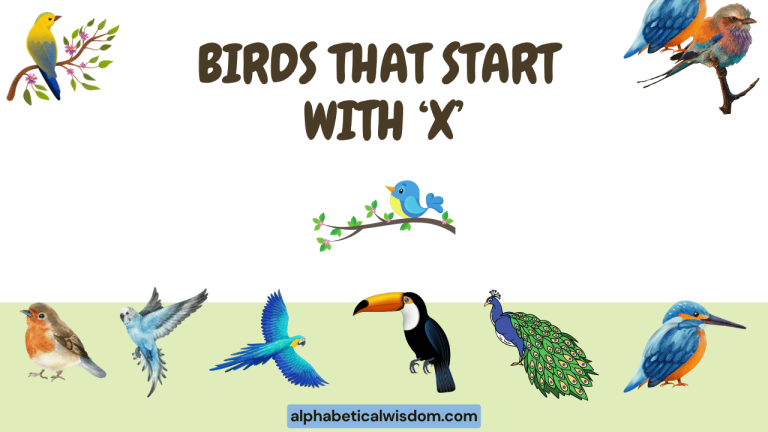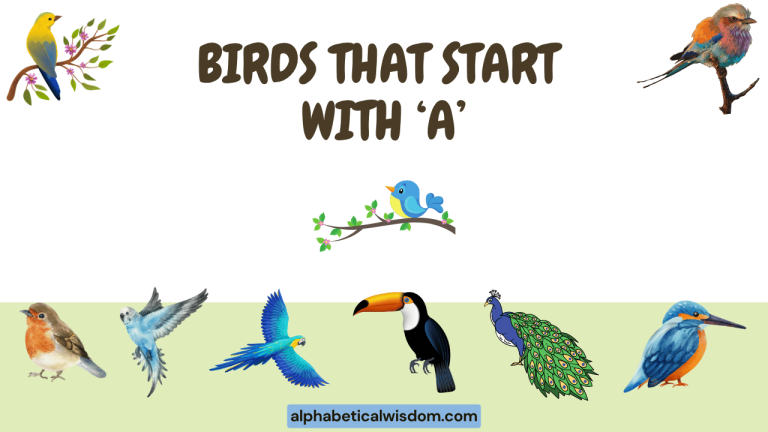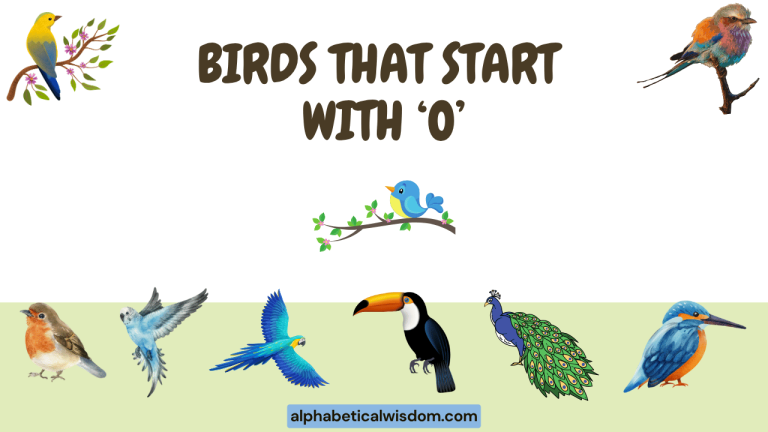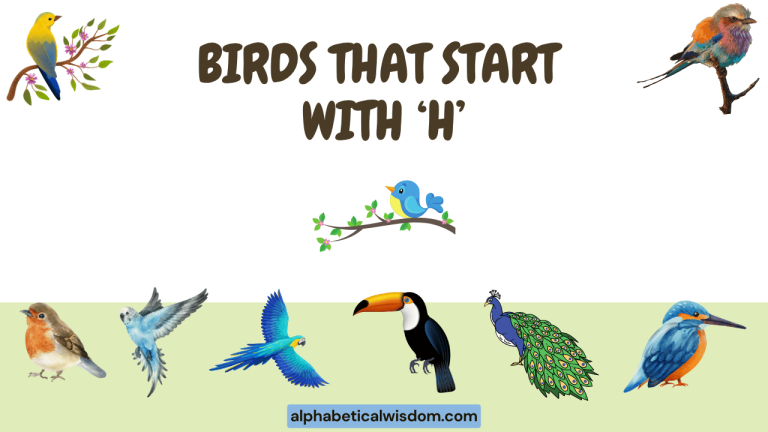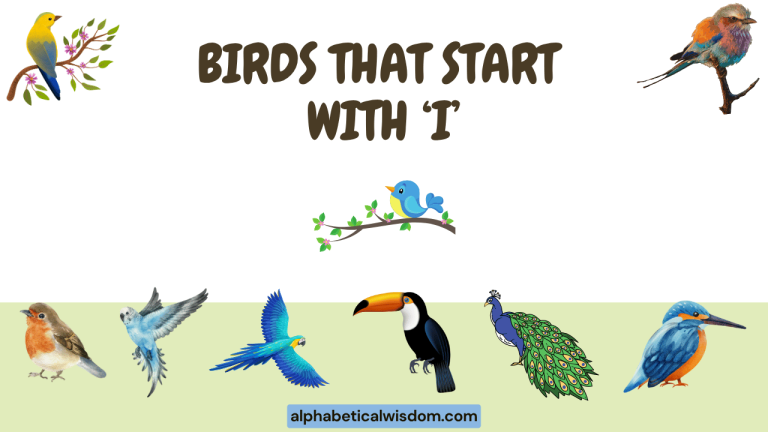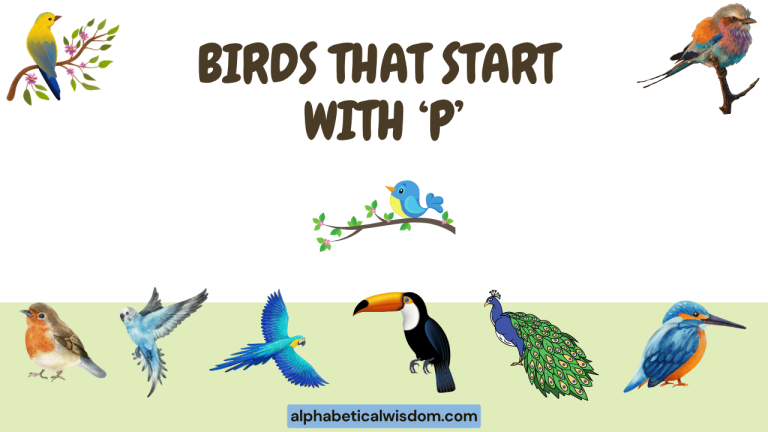Birds That Start With V: A Grammar Exploration
Exploring the fascinating world of birds can be an enriching experience, especially when combined with grammar practice. Focusing on birds whose names begin with the letter “V” provides a unique opportunity to delve into specific grammatical concepts such as noun usage, sentence construction, and descriptive language.
This article is designed for English language learners, bird enthusiasts, and anyone looking to improve their grammar skills through an engaging and ornithologically themed approach. We will cover definitions, examples, usage rules, and common mistakes, ensuring a comprehensive understanding.
Table of Contents
- Introduction
- Definition of “Birds That Start With V” in Grammar
- Structural Breakdown: Noun Usage and Sentence Construction
- Types and Categories of Sentences Featuring “V” Birds
- Examples of Sentences with “V” Birds
- Usage Rules: Articles, Plurals, and Possessives
- Common Mistakes
- Practice Exercises
- Advanced Topics: Figurative Language and Idioms
- FAQ Section
- Conclusion
Definition of “Birds That Start With V” in Grammar
In the context of English grammar, “birds that start with V” refers to the use of nouns (specifically, the names of bird species beginning with the letter “V”) within sentences. These nouns function as subjects, objects, or complements, and their correct usage adheres to standard grammatical rules regarding articles, plurals, possessives, and verb agreement.
The specific birds involved include species like the Vulture and various types of Violetear Hummingbirds. Understanding how to properly incorporate these nouns into sentences is crucial for clear and effective communication.
The grammatical role of bird names starting with “V” is no different from any other noun. They can be concrete nouns, referring to tangible, physical entities.
They can be singular or plural, requiring attention to verb conjugation. Context determines which article (a, an, the) is necessary, or if no article is needed at all.
Mastering these elements contributes to grammatical accuracy and fluency.
Furthermore, using bird names in sentences can enhance descriptive writing. Adjectives can be used to provide more details about the bird, such as its size, color, habitat, or behavior.
Adverbs can modify verbs to describe how the bird moves, sings, or interacts with its environment. This combination of nouns, adjectives, and adverbs creates vivid and engaging prose.
Structural Breakdown: Noun Usage and Sentence Construction
The structural breakdown involves analyzing how these “V” bird names fit into different sentence structures. The noun, representing the bird, can occupy various positions within a sentence, each affecting the sentence’s meaning and grammatical correctness.
Subject: The noun acts as the main actor in the sentence. For instance, “The Vulture soared high above the mountains.” Here, “Vulture” is the subject performing the action of “soaring.”
Object: The noun receives the action of the verb. Example: “The ornithologist observed the Violetear.” In this case, “Violetear” is the object being observed.
Complement: The noun renames or describes the subject. Example: “That bird is a Vulture.” Here, “Vulture” complements the subject “bird,” providing more information about it.
Understanding these roles is essential for constructing grammatically sound sentences. The correct placement of the noun, along with appropriate verb agreement, ensures clarity and precision in communication.
Types and Categories of Sentences Featuring “V” Birds
Sentences featuring birds that start with “V” can be categorized based on their purpose and structure. Recognizing these categories aids in crafting diverse and grammatically correct sentences.
Declarative Sentences
Declarative sentences make a statement. They are the most common type of sentence and end with a period.
Example: “The Vulture is a scavenger bird.”
Interrogative Sentences
Interrogative sentences ask a question. They always end with a question mark.
Example: “Have you ever seen a Violetear in its natural habitat?”
Imperative Sentences
Imperative sentences give a command or make a request. They often omit the subject “you.”
Example: “Watch for the Vultures circling overhead.”
Exclamatory Sentences
Exclamatory sentences express strong emotion. They end with an exclamation point.
Example: “What a magnificent Vulture!”
Examples of Sentences with “V” Birds
This section provides a variety of examples demonstrating the use of bird names starting with “V” in different sentence structures. These examples illustrate grammatical principles and offer models for constructing your own sentences.
Simple Sentences
Simple sentences consist of one independent clause containing a subject and a verb.
| Sentence | Grammatical Analysis |
|---|---|
| The Vulture flies. | Subject: Vulture; Verb: flies |
| A Violetear hovers. | Subject: Violetear; Verb: hovers |
| That Vulture is large. | Subject: Vulture; Verb: is |
| The Violetear sips nectar. | Subject: Violetear; Verb: sips |
| The Vulture circles. | Subject: Vulture; Verb: circles |
| A Violetear sings. | Subject: Violetear; Verb: sings |
| This Vulture is old. | Subject: Vulture; Verb: is |
| The Violetear feeds. | Subject: Violetear; Verb: feeds |
| That Vulture rests. | Subject: Vulture; Verb: rests |
| One Violetear nests. | Subject: Violetear; Verb: nests |
| The Vulture waits. | Subject: Vulture; Verb: waits |
| A Violetear flits. | Subject: Violetear; Verb: flits |
| The Vulture swoops. | Subject: Vulture; Verb: swoops |
| The Violetear buzzes. | Subject: Violetear; Verb: buzzes |
| The Vulture glides. | Subject: Vulture; Verb: glides |
| A Violetear drinks. | Subject: Violetear; Verb: drinks |
| This Vulture observes. | Subject: Vulture; Verb: observes |
| That Violetear dances. | Subject: Violetear; Verb: dances |
| The Vulture protects. | Subject: Vulture; Verb: protects |
| The Violetear preens. | Subject: Violetear; Verb: preens |
Compound Sentences
Compound sentences consist of two or more independent clauses joined by a coordinating conjunction (and, but, or, nor, for, so, yet) or a semicolon.
| Sentence | Grammatical Analysis |
|---|---|
| The Vulture soared, and the Violetear hovered nearby. | Independent Clause 1: The Vulture soared; Independent Clause 2: the Violetear hovered nearby; Conjunction: and |
| The Violetear sipped nectar, but the Vulture looked for carrion. | Independent Clause 1: The Violetear sipped nectar; Independent Clause 2: the Vulture looked for carrion; Conjunction: but |
| The Vulture circles above, and the Violetear sits still. | Independent Clause 1: The Vulture circles above; Independent Clause 2: the Violetear sits still; Conjunction: and |
| The Violetear sang sweetly, so the Vulture flew on by. | Independent Clause 1: The Violetear sang sweetly; Independent Clause 2: the Vulture flew on by; Conjunction: so |
| The Vulture waited patiently, for the prey was nearby. | Independent Clause 1: The Vulture waited patiently; Independent Clause 2: the prey was nearby; Conjunction: for |
| The Violetear flits quickly, yet it returns to the same flower. | Independent Clause 1: The Violetear flits quickly; Independent Clause 2: it returns to the same flower; Conjunction: yet |
| The Vulture swooped down, or it could have flown away. | Independent Clause 1: The Vulture swooped down; Independent Clause 2: it could have flown away; Conjunction: or |
| The Violetear buzzes loudly, so the other birds take flight. | Independent Clause 1: The Violetear buzzes loudly; Independent Clause 2: the other birds take flight; Conjunction: so |
| The Vulture glides effortlessly, and the wind guides its way. | Independent Clause 1: The Vulture glides effortlessly; Independent Clause 2: the wind guides its way; Conjunction: and |
| The Violetear drinks deeply, for the nectar is very sweet. | Independent Clause 1: The Violetear drinks deeply; Independent Clause 2: the nectar is very sweet; Conjunction: for |
| The Vulture observes carefully, but it does not move. | Independent Clause 1: The Vulture observes carefully; Independent Clause 2: it does not move; Conjunction: but |
| The Violetear dances lightly, yet it never loses its balance. | Independent Clause 1: The Violetear dances lightly; Independent Clause 2: it never loses its balance; Conjunction: yet |
| The Vulture protects its nest, and the young ones watch. | Independent Clause 1: The Vulture protects its nest; Independent Clause 2: the young ones watch; Conjunction: and |
| The Violetear preens its feathers, so it looks beautiful. | Independent Clause 1: The Violetear preens its feathers; Independent Clause 2: it looks beautiful; Conjunction: so |
| The Vulture is huge, but the Violetear is tiny. | Independent Clause 1: The Vulture is huge; Independent Clause 2: the Violetear is tiny; Conjunction: but |
| The Violetear is fast, and it is hard to see. | Independent Clause 1: The Violetear is fast; Independent Clause 2: it is hard to see; Conjunction: and |
| The Vulture eats meat, so it is a carnivore. | Independent Clause 1: The Vulture eats meat; Independent Clause 2: it is a carnivore; Conjunction: so |
| The Violetear flies, and then it rests. | Independent Clause 1: The Violetear flies; Independent Clause 2: it rests; Conjunction: and |
| The Vulture is smart, but it is ugly. | Independent Clause 1: The Vulture is smart; Independent Clause 2: it is ugly; Conjunction: but |
| The Violetear nests, and the eggs hatch. | Independent Clause 1: The Violetear nests; Independent Clause 2: the eggs hatch; Conjunction: and |
Complex Sentences
Complex sentences contain one independent clause and one or more dependent clauses.
| Sentence | Grammatical Analysis |
|---|---|
| Because the Vulture is a scavenger, it plays an important role in the ecosystem. | Independent Clause: it plays an important role in the ecosystem; Dependent Clause: Because the Vulture is a scavenger |
| Although the Violetear is small, it is very agile. | Independent Clause: it is very agile; Dependent Clause: Although the Violetear is small |
| When the Vulture circles, it indicates that there is carrion nearby. | Independent Clause: it indicates that there is carrion nearby; Dependent Clause: When the Vulture circles |
| Since the Violetear feeds on nectar, it is important for pollination. | Independent Clause: it is important for pollination; Dependent Clause: Since the Violetear feeds on nectar |
| If you see a Vulture, be sure to observe its behavior closely. | Independent Clause: be sure to observe its behavior closely; Dependent Clause: If you see a Vulture |
| Before the Violetear migrates, it builds up its energy reserves. | Independent Clause: it builds up its energy reserves; Dependent Clause: Before the Violetear migrates |
| Wherever the Vulture flies, it is watched by other birds. | Independent Clause: it is watched by other birds; Dependent Clause: Wherever the Vulture flies |
| Until the Violetear stops moving, it is hard to see. | Independent Clause: it is hard to see; Dependent Clause: Until the Violetear stops moving |
| After the Vulture lands, it looks around for food. | Independent Clause: it looks around for food; Dependent Clause: After the Vulture lands |
| While the Violetear drinks, it is always on alert. | Independent Clause: it is always on alert; Dependent Clause: While the Violetear drinks |
| Because the Vulture is important, people protect it. | Independent Clause: people protect it; Dependent Clause: Because the Vulture is important |
| Although the Violetear is tiny, it protects its young. | Independent Clause: it protects its young; Dependent Clause: Although the Violetear is tiny |
| When the Vulture eats, it is the only bird eating. | Independent Clause: it is the only bird eating; Dependent Clause: When the Vulture eats |
| Since the Violetear is beautiful, people like to watch it. | Independent Clause: people like to watch it; Dependent Clause: Since the Violetear is beautiful |
| If you see the Vulture, you will be amazed. | Independent Clause: you will be amazed; Dependent Clause: If you see the Vulture |
| Before the Violetear flies away, take a picture of it. | Independent Clause: take a picture of it; Dependent Clause: Before the Violetear flies away |
| Wherever the Vulture goes, it leaves a trail. | Independent Clause: it leaves a trail; Dependent Clause: Wherever the Vulture goes |
| Until the Violetear sings, we had not heard a song. | Independent Clause: we had not heard a song; Dependent Clause: Until the Violetear sings |
| After the Vulture sleeps, it will fly again. | Independent Clause: it will fly again; Dependent Clause: After the Vulture sleeps |
| While the Violetear rests, it looks very fragile. | Independent Clause: it looks very fragile; Dependent Clause: While the Violetear rests |
Compound-Complex Sentences
Compound-complex sentences contain two or more independent clauses and one or more dependent clauses.
| Sentence | Grammatical Analysis |
|---|---|
| Because the Vulture is essential for cleaning up carrion, it should be protected, and people should avoid harming it. | Independent Clause 1: it should be protected; Independent Clause 2: people should avoid harming it; Dependent Clause: Because the Vulture is essential for cleaning up carrion |
| Although the Violetear is tiny, it is very territorial, and it will defend its feeding area fiercely. | Independent Clause 1: it is very territorial; Independent Clause 2: it will defend its feeding area fiercely; Dependent Clause: Although the Violetear is tiny |
| When the Vulture circles overhead, it is searching for food, and it will descend quickly once it spots something. | Independent Clause 1: it is searching for food; Independent Clause 2: it will descend quickly once it spots something; Dependent Clause: When the Vulture circles overhead |
| Since the Violetear relies on nectar from flowers, it is an important pollinator, and it helps maintain the health of the ecosystem. | Independent Clause 1: it is an important pollinator; Independent Clause 2: it helps maintain the health of the ecosystem; Dependent Clause: Since the Violetear relies on nectar from flowers |
| If you want to see a Vulture, you should visit areas with open grasslands, and bring a camera to capture its majestic flight. | Independent Clause 1: you should visit areas with open grasslands; Independent Clause 2: bring a camera to capture its majestic flight; Dependent Clause: If you want to see a Vulture |
| Before the Violetear migrates to warmer climates, it consumes large amounts of nectar, and it prepares for the long journey ahead. | Independent Clause 1: it consumes large amounts of nectar; Independent Clause 2: it prepares for the long journey ahead; Dependent Clause: Before the Violetear migrates to warmer climates |
| Because the Vulture is important, it is protected, and people help it to survive. | Independent Clause 1: it is protected; Independent Clause 2: people help it to survive; Dependent Clause: Because the Vulture is important |
| Although the Violetear is fast, other birds are as well, and they all fly together. | Independent Clause 1: other birds are as well; Independent Clause 2: they all fly together; Dependent Clause: Although the Violetear is fast |
| When the Vulture lands, it looks around, and then it eats. | Independent Clause 1: it looks around; Independent Clause 2: then it eats; Dependent Clause: When the Vulture lands |
| Since the Violetear is beautiful, people watch it, and they take pictures. | Independent Clause 1: people watch it; Independent Clause 2: they take pictures; Dependent Clause: Since the Violetear is beautiful |
| If you see the Vulture, you will be amazed, and you will tell others about it. | Independent Clause 1: you will be amazed; Independent Clause 2: you will tell others about it; Dependent Clause: If you see the Vulture |
| Before the Violetear flies away, take a picture, and show it to your friends. | Independent Clause 1: take a picture; Independent Clause 2: show it to your friends; Dependent Clause: Before the Violetear flies away |
| Wherever the Vulture goes, it leaves a trail, and other birds follow. | Independent Clause 1: it leaves a trail; Independent Clause 2: other birds follow; Dependent Clause: Wherever the Vulture goes |
| Until the Violetear sings, we had not heard a song, and now we are happy. | Independent Clause 1: we had not heard a song; Independent Clause 2: now we are happy; Dependent Clause: Until the Violetear sings |
| After the Vulture sleeps, it will fly again, and it will look for food. | Independent Clause 1: it will fly again; Independent Clause 2: it will look for food; Dependent Clause: After the Vulture sleeps |
| While the Violetear rests, it looks very fragile, and the wind can blow it. | Independent Clause 1: it looks very fragile; Independent Clause 2: the wind can blow it; Dependent Clause: While the Violetear rests |
| Because the Vulture is strong, it can fly far, and others watch it. | Independent Clause 1: it can fly far; Independent Clause 2: others watch it; Dependent Clause: Because the Vulture is strong |
| Although the Violetear is tiny, it is very energetic, and it flies all day. | Independent Clause 1: it is very energetic; Independent Clause 2: it flies all day; Dependent Clause: Although the Violetear is tiny |
| When the Vulture eats, it is the only bird eating, and it makes a mess. | Independent Clause 1: it is the only bird eating; Independent Clause 2: it makes a mess; Dependent Clause: When the Vulture eats |
| Since the Violetear flies fast, it is hard to see, and you must be very quick. | Independent Clause 1: it is hard to see; Independent Clause 2: you must be very quick; Dependent Clause: Since the Violetear flies fast |
Descriptive Sentences
Descriptive sentences use adjectives and adverbs to provide detailed information about the bird.
| Sentence | Grammatical Analysis |
|---|---|
| The majestic Vulture soared gracefully through the vast, open sky. | Adjectives: majestic, vast, open; Adverb: gracefully |
| The tiny Violetear hovered delicately, sipping sweet nectar from the vibrant flowers. | Adjectives: tiny, sweet, vibrant; Adverb: delicately |
| The large Vulture slowly descended, carefully scanning the ground for its next meal. | Adjectives: large, next; Adverbs: slowly, carefully |
| The colorful Violetear quickly flitted among the lush, green foliage. | Adjectives: colorful, lush, green; Adverb: quickly |
| The powerful Vulture confidently dominated the wide, expansive landscape. | Adjectives: powerful, wide, expansive; Adverb: confidently |
| The vibrant Violetear energetically darted around, busily collecting nectar. | Adjectives: vibrant; Adverbs: energetically, busily |
| The old Vulture patiently waited, quietly observing the distant horizon. | Adjectives: old, distant; Adverbs: patiently, quietly |
| The agile Violetear swiftly maneuvered, deftly avoiding the thorny branches. | Adjectives: agile, thorny; Adverbs: swiftly, deftly |
| The scavenging Vulture efficiently cleaned, thoroughly removing all traces of carrion. | Adjectives: scavenging; Adverbs: efficiently, thoroughly |
| The beautiful Violetear elegantly danced, gracefully showcasing its iridescent plumage. | Adjectives: beautiful, iridescent; Adverbs: elegantly, gracefully |
| The huge Vulture fiercely guarded, protectively defending its precious nest. | Adjectives: huge, precious; Adverbs: fiercely, protectively |
| The swift Violetear rapidly flew, skillfully navigating the dense forest. | Adjectives: swift, dense; Adverbs: rapidly, skillfully |
| The hungry Vulture eagerly searched, anxiously anticipating a fulfilling meal. | Adjectives: hungry, fulfilling; Adverbs: eagerly, anxiously |
| The energetic Violetear tirelessly buzzed, constantly seeking out new sources of nectar. | Adjectives: energetic, new; Adverbs: tirelessly, constantly |
| The watchful Vulture carefully observed, silently monitoring the surrounding environment. | Adjectives: watchful, surrounding; Adverbs: carefully, silently |
| The delicate Violetear gently sipped, softly extracting the sweet, floral essence. | Adjectives: delicate, sweet, floral; Adverbs: gently, softly |
| The imposing Vulture boldly perched, authoritatively surveying its vast territory. | Adjectives: imposing, vast; Adverbs: boldly, authoritatively |
| The sprightly Violetear playfully flitted, merrily enjoying the warm, sunny weather. | Adjectives: sprightly, warm, sunny; Adverbs: playfully, merrily |
| The mature Vulture wisely ruled, responsibly maintaining the balance of nature. | Adjectives: mature; Adverbs: wisely, responsibly |
| The busy Violetear diligently worked, steadily contributing to the pollination process. | Adjectives: busy; Adverbs: diligently, steadily |
Usage Rules: Articles, Plurals, and Possessives
Correctly using articles, forming plurals, and indicating possession are crucial for grammatical accuracy when writing about birds that start with “V.”
Articles (a, an, the)
“A” is used before singular, countable nouns that begin with a consonant sound.
Example: “A Vulture is circling overhead.”
“An” is used before singular, countable nouns that begin with a vowel sound.
Example: While vulture and violetear do not begin with a vowel, if you are using an abbreviation such as “an unidentified vulture” the ‘an’ article would be appropriate.
“The” is used to refer to a specific noun, or when the noun has already been mentioned.
Example: “The Vulture I saw yesterday was enormous.”
Plural Forms
Most nouns form their plural by adding “-s” to the end.
Example: “Vultures are often misunderstood creatures.”
Some nouns have irregular plural forms.
Example: While ‘Vulture’ and ‘Violetear’ do not have irregular plural forms, it is important to keep irregular forms in mind.
Possessive Forms
To show possession, add “‘s” to a singular noun.
Example: “The Vulture’s wings are impressive.”
For plural nouns ending in “s,” add only an apostrophe (‘).
Example: “The Vultures’ habitat is protected.”
Common Mistakes
English language learners often make predictable errors when using nouns, articles, and possessives. Recognizing these common mistakes can help improve accuracy.
| Incorrect | Correct | Explanation |
|---|---|---|
| A Vulture are scavenger. | A Vulture is a scavenger. | Verb agreement: singular subject requires singular verb. |
| The violetears drink nectar. | The Violetears drink nectar. | The plural form of violetear is Violetears. |
| Vulture’s habitat are threatened. | The Vulture’s habitat is threatened. | Singular possessive needs singular verb; article ‘The’ needed for specificity. |
| I saw vulture yesterday. | I saw a Vulture yesterday. | Missing article before a singular, countable noun. |
| The Violetear’s colors is vibrant. | The Violetear’s colors are vibrant. | Plural subject ‘colors’ requires plural verb ‘are’. |
| Vulture eat carrion. | Vultures eat carrion. | Plural noun ‘Vultures’ needed to match the general statement. |
| A Violetear flys quickly. | A Violetear flies quickly. | Verb agreement: ‘flies’ is the correct form for a singular subject. |
| Vulture’s is important bird. | The Vulture is an important bird. | Missing article, incorrect possessive form, and missing article. |
| Violetear’s nest are small. | The Violetear’s nests are small. | Plural subject ‘nests’ requires plural verb ‘are’. |
| I like to watch a Violetears. | I like to watch Violetears. | Do not use ‘a’ with plural noun. |
Practice Exercises
These exercises provide opportunities to apply the grammatical concepts discussed in this article. They range in difficulty and focus on various aspects of noun usage, sentence construction, and article/possessive forms.
Exercise 1: Sentence Completion
Complete the following sentences with the correct form of the bird name (Vulture or Violetear) and any necessary articles or verbs.
| Question | Answer |
|---|---|
| 1. ______ are known for their scavenging habits. | Vultures are known for their scavenging habits. |
| 2. I spotted ______ Violetear in my garden this morning. | I spotted a Violetear in my garden this morning. |
| 3. ______ wingspan of ______ Vulture is quite impressive. | The wingspan of a Vulture is quite impressive. |
| 4. ______ Violetear sips nectar from the flower. | The Violetear sips nectar from the flower. |
| 5. ______ are essential for cleaning up carrion in nature. | Vultures are essential for cleaning up carrion in nature. |
| 6. ______ is known for its vibrant colors and energetic behavior. | The Violetear is known for its vibrant colors and energetic behavior. |
| 7. ______ often circle high in the sky, searching for food. | Vultures often circle high in
sky, searching for food. |
| 8. ______ can hover mid-air while feeding on nectar. | Violetears can hover mid-air while feeding on nectar. |
| 9. The guide pointed out ______ Vulture perched on ______ branch. | The guide pointed out a Vulture perched on a branch. |
| 10. ______ Violetears in this region are known to migrate during winter. | The Violetears in this region are known to migrate during winter. |
Exercise 2: Correct the Errors
Identify and correct the grammatical errors in the following sentences.
| Question | Answer |
|---|---|
| 1. A Vulture are a scavenger bird. | A Vulture is a scavenger bird. |
| 2. The Violetear’s colors is beautiful. | The Violetear’s colors are beautiful. |
| 3. I saw vulture in the sky. | I saw a Vulture in the sky. |
| 4. Violetear eat nectar from flowers. | Violetears eat nectar from flowers. |
| 5. The Vulture’s habitat are threatened by deforestation. | The Vulture’s habitat is threatened by deforestation. |
| 6. Violetear flys very fast. | The Violetear flies very fast. |
| 7. The Vulture’s is important bird for the ecosystem. | The Vulture is an important bird for the ecosystem. |
| 8. Violetear’s wings are small. | The Violetear’s wings are small. |
| 9. I like watching a Violetears in my garden. | I like watching Violetears in my garden. |
| 10. The vulture protect its nest. | The Vulture protects its nest. |
Exercise 3: Sentence Construction
Write sentences using the given words, ensuring correct grammar and sentence structure.
| Words | Example Sentence |
|---|---|
| Vulture, soar, sky | The Vulture soared gracefully across the clear sky. |
| Violetear, nectar, flower | The Violetear delicately sips nectar from the vibrant flower. |
| Vultures, carrion, eat | Vultures efficiently eat carrion, playing a crucial role in the ecosystem. |
| Violetears, hover, wings | Violetears can hover mid-air by rapidly beating their wings. |
| Vulture, scavenger, important | The Vulture, as a scavenger, is an important component of the environment. |
| Violetear, small, agile | The Violetear is a small but incredibly agile bird. |
| Vultures, circle, prey | Vultures circle high above, searching for their next prey. |
| Violetear, buzz, quickly | The Violetear buzzes quickly from flower to flower. |
| Vulture, powerful, wingspan | The Vulture has a powerful wingspan that allows it to soar for hours. |
| Violetear, vibrant, plumage | The Violetear displays a vibrant plumage that is truly captivating. |
Advanced Topics: Figurative Language and Idioms
Exploring the use of “V” bird names in figurative language and idioms adds depth to language understanding and creative expression.
Figurative Language
Metaphor: A metaphor compares two unlike things without using “like” or “as.”
Example: “The Vulture was a shadow of death circling above.” (Here, the vulture is metaphorically compared to a shadow of death.)
Simile: A simile compares two unlike things using “like” or “as.”
Example: “The Violetear moved as quick as a hummingbird.” (Here, the speed of the Violetear is compared to that of a hummingbird.)
Personification: Personification gives human qualities to non-human things.
Example: “The Vulture patiently contemplated its next meal.” (Here, the vulture is given the human quality of contemplation.)
Idioms
Currently, there are no common idioms that specifically use the names “Vulture” or “Violetear.” However, the characteristics of these birds could inspire new idiomatic expressions. For instance, “circling like a vulture” could describe someone who is opportunistically waiting for a misfortune to occur to someone else.
FAQ Section
Are there many birds whose names start with “V”?
No, there are relatively few bird species whose common names begin with the letter “V.” The most commonly referenced are the various types of Vultures and Violetear hummingbirds.
Is it grammatically correct to start a sentence with “Vulture” or “Violetear”?
Yes, it is perfectly acceptable to start a sentence with “Vulture” or “Violetear,” as long as the sentence adheres to standard grammatical rules.
How do I know when to use “a” versus “the” before “Vulture” or “Violetear”?
Use “a” when referring to a Vulture or Violetear in general or for the first time. Use “the” when referring to a specific Vulture or Violetear, or one that has already been mentioned.
Can “Vulture” or “Violetear” ever be used as verbs?
No, “Vulture” and “Violetear” are typically used as nouns. They do not have common verb forms.
What are some other ways to describe birds that start with “V” in descriptive writing?
You can use adjectives related to their appearance (e.g., “large Vulture,” “colorful Violetear”), behavior (e.g., “soaring Vulture,” “hovering Violetear”), or habitat (e.g., “mountain Vulture,” “tropical Violetear”).
Conclusion
Incorporating bird names that start with the letter “V” into your grammar practice offers a unique and engaging way to reinforce your understanding of English language principles. By exploring noun usage, sentence construction, and common grammatical rules through the lens of ornithology, you can enhance your communication skills and deepen your appreciation for the natural world.
Remember to practice regularly and pay attention to the nuances of article usage, plural forms, and possessive constructions. With consistent effort, you’ll be well-equipped to write clear, accurate, and descriptive sentences featuring these fascinating birds.
